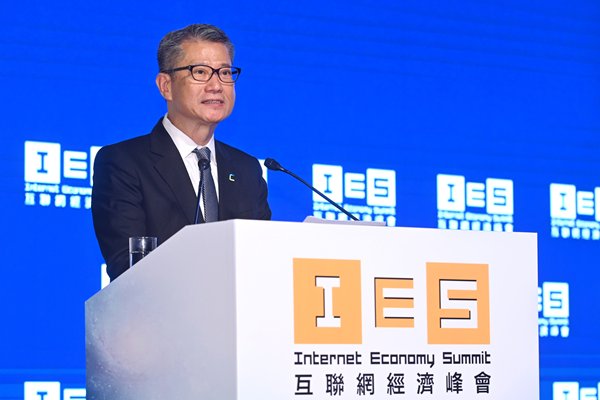Gov't Backs Fintech Future

Financial Secretary Paul Chan
Technology is bringing unprecedented opportunities as well as challenges to our financial services - and the customers they court with their innovative offerings. The title of today's forum, "The New Era of Finance Redefined", has aptly pointed this out.
As one of the world's leading international financial centres, Hong Kong is blessed with a strategic location, the "one country, two systems" unique arrangement and ever-growing economic collaboration with the Mainland of China.
Moreover, Hong Kong has a remarkably enabling environment for the development of fintech. After all, we boast a highly efficient infrastructure in information and communications technology, transparent and reassuring financial regulation, the free flow of capital, talent and information, the rule of law underpinned by independent judiciary, and a Government committed to a fintech future.
The results, to date, are clear and compelling. Hong Kong is home to more than 550 fintech companies and startups. Celebrated innovation laboratories and accelerator programmes such as Accenture FinTech Innovation Lab, Deloitte Asia Pacific Blockchain Lab and the Floor from Israel have also established a presence here.
Growing fintech sector
Investment in our fintech sector is equally impressive. Over the past five years, fintech companies here have raised over US$1.1 billion, compared favourably with those based in Japan, Australia or Singapore.
The Hong Kong Special Administrative Region Government is determined to keep this momentum going and be its staunch backer. Indeed, fintech is one of our top priorities, and we have rolled out a wealth of fintech programmes and initiatives.
Last September, we launched the Faster Payment System. It connects banks and stored-value facilities - the so-called "e-wallets" - enabling the public to transfer funds instantly, in both Hong Kong dollars and Renminbi, anytime, anywhere. You need only use a mobile phone number or an email address as an account proxy.
As of the end of February, the Faster Payment System had recorded more than 2.5 million registrations, processing over 8.7 million transactions in all. A very fast start, I would say.
At the same time, we introduced the common QR code standard for retail payments. It helps merchants, especially small and medium enterprises, use a single QR code to accept various payment schemes.
In January, the first phase of the Open Application Programming Interface framework for banks got going. In enabling collaboration with technology firms, it offers more innovative financial services.
Our Securities & Futures Commission last year released regulatory guidelines to impose licensing conditions on companies managing, or intending to manage, portfolios that invest in virtual assets. The commission is now exploring whether it is suitable to and, if so, how it might regulate virtual asset trading platforms.
Emergence of virtual banks
As George noted in his address, the Hong Kong Monetary Authority has started granting virtual bank licences last month. This is a milestone for Hong Kong opening up the possibility for our banking sector to offer a new kind of customer experience.
I'm sure the emergence of virtual banks will help SMEs and boost the competitiveness of the entire banking sector, and transform the banking experience for customers.
Insurtech is the future as well. And we must all plan for it. Last year, the Insurance Authority launched a Fast Track scheme. It expedites applications by insurance companies, in or from Hong Kong, looking to use digital distribution channels solely in carrying out their businesses.
The first virtual insurer under the Fast Track scheme was granted a licence last December. I am sure more will follow.
The Hong Kong Federation of Insurers has also launched two insurtech initiatives: the Motor Insurance DLT-based Authentication System or MIDAS, a blockchain application to help authenticate motor insurance cover notes, and the Insurance Fraud Prevention Claims Database. This helps detect insurance fraud through artificial intelligence and big data means. It will prove particularly beneficial in cases involving multiple claims and syndicates.
In trade finance, a blockchain-based platform was developed by a consortium of 12 banks here last October. Called eTradeConnect, it enables participating banks to digitise and share trade documents, automate processes, reduce the risk of fraud and improve overall trade finance processes.
The Hong Kong Monetary Authority is now exploring connecting eTradeConnect with more overseas initiatives.
Financial Secretary Paul Chan gave these remarks at the FinTech Forum of the Internet Economy Summit 2019 on April 16.
US Stocks Rise On Hopes Of Pause In Rate Increases
Wall Street stocks finished solidly higher on Thursday, reflecting better sentiment on the US economy and a consensus vi... Read more
China's Financial Risks 'controllable': Regulators
The head of the National Financial Regulatory Administration on Thursday told a high-profile forum in Shanghai that the ... Read more
Banks Cut Yuan Deposit Rates, Could Boost Consumption
China's biggest banks on Thursday said they have lowered interest rates on yuan deposits, in actions that could ease pre... Read more
Cheese And Wine Put EU, Australia Deal In Peril
Australia on Thursday threatened to walk away from a blockbuster free trade deal with the European Union unless its prod... Read more
US Stocks End Mixed As Tech Shares Are Sold Off
Gains by industrial companies lifted the Dow on Wednesday, while weakness among technology shares pushed the Nasdaq deci... Read more
Amazon 'plans Prime Video Streaming Service With Ads'
Amazon.com is planning to launch an advertising-supported tier of its Prime Video streaming service, the Wall Street Jou... Read more

